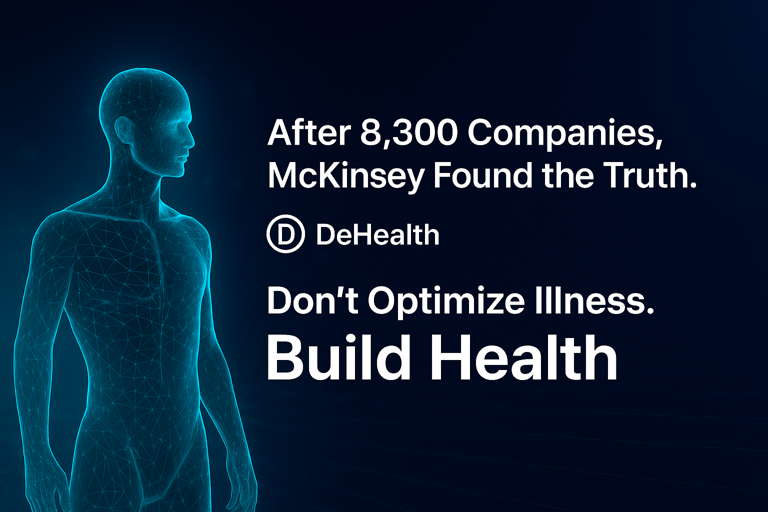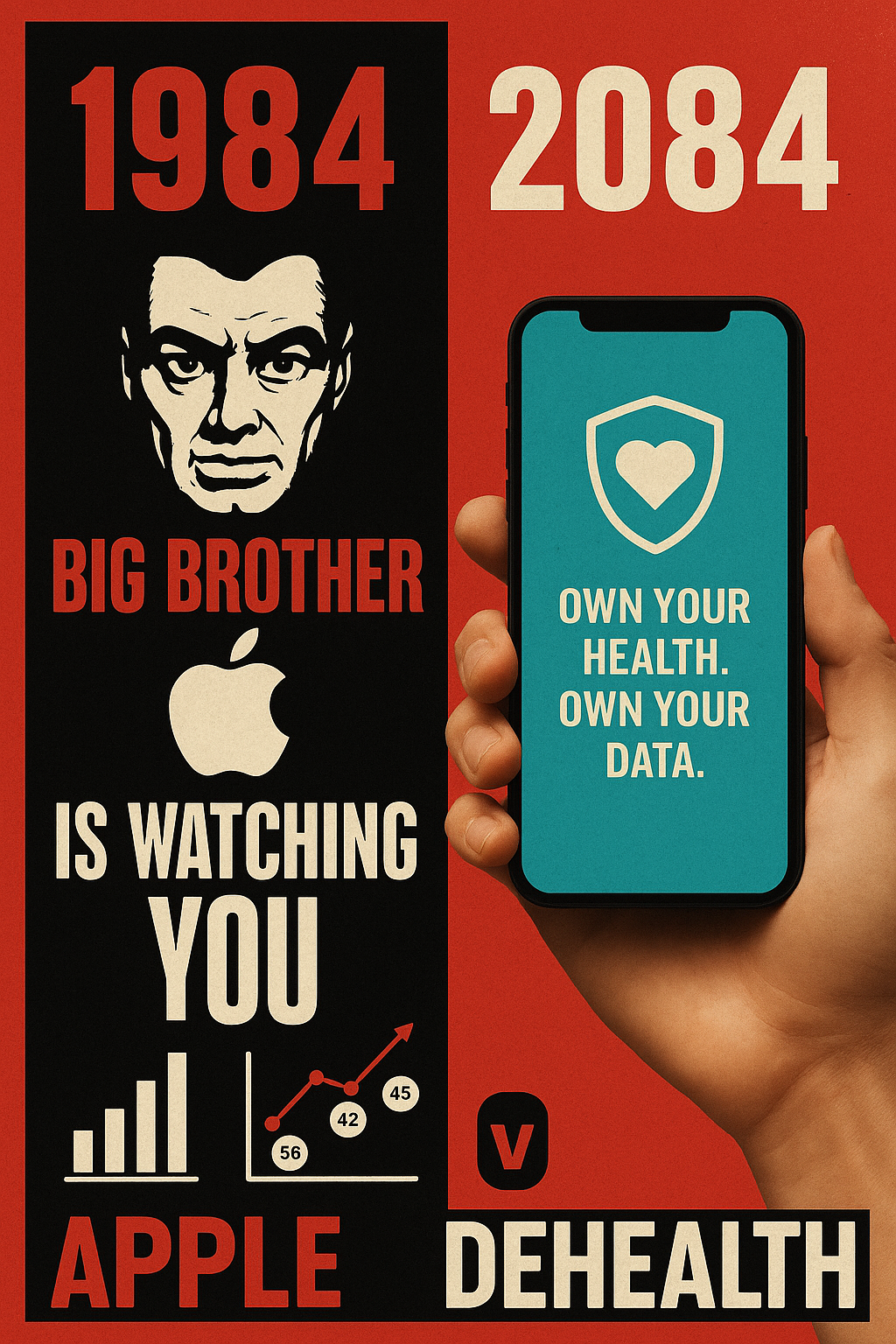After 8,300 Companies, McKinsey Found the Truth. DeHealth Built It. Don't Optimize Illness. Build Health.

Created: 7 Jun, 2025
Updated: 7 Jun, 2025
Read post: 05:39 min read
 2953
2953
- 1. From Siloes to Sovereignty
- Your Health, Your Infrastructure
- 2. The End of Actuarial Guesswork: Insurance Rewritten
- 3. A Health Avatar That Knows You Better Than Your Doctor
- 4. One Platform. One Health ID. Global Reach.
- 5. Breaking the Actuarial Mold
- 6. The Network Effect of Self-Knowledge
- 7. Founders Who Think Like Architects
- The Sixth Strategy McKinsey Forgot: Digital Sovereignty
- 6. Return power to the individual. Make them sovereign over their health, their data, their future.
After 8,300 Companies, McKinsey Found the Truth. DeHealth Built It.
Don't Optimize Illness. Build Health.
McKinsey studied 8,300 companies and revealed what really drives explosive productivity. It's not cutting costs or chasing KPIs—it's the courage to build new models. Here's how DeHealth isn't just following that playbook—it's writing its own.
“Standout firms don’t just optimize — they invent new models. One exceptional company can lift productivity for an entire nation.” — McKinsey Global Institute, The Power of One
“Leading companies scale new business models, not just improve old ones. Their competitive advantage is structural.”
“Productivity isn’t about squeezing harder. It’s about building smarter.”
In boardrooms across the globe, consultants still chant the same mantra: "Cut costs. Optimize workflows. Maximize efficiency."
But McKinsey just dropped a bombshell. After studying over 8,300 companies, the verdict is in:
True productivity doesn't come from squeezing the system. It comes from reinventing it.
Across 8,300 companies, the best performers weren’t those who optimized KPIs. They were the ones who reinvented the rules.
From Apple to Amazon, from Nvidia to Zeiss, the standout performers aren’t those who improved incrementally. They are the ones who built new architectures for value.
And nowhere is this insight more urgent than in healthcare—an industry gasping for reinvention. Enter DeHealth, a startup that doesn’t want to fix the broken system. It wants to replace it.
1. From Siloes to Sovereignty
McKinsey's research shows: companies that reinvent their categories lead the charge in national productivity.
DeHealth doesn’t try to make hospitals more efficient. It asks: what if you never had to go in the first place?
Its core product isn’t a booking tool or symptom checker. It’s a unified digital identity for your health — pulling together wearables, lab tests, daily tracking, and lifestyle habits into one AI-powered, secure dashboard.
Your Health, Your Infrastructure
DeHealth goes further: it builds a personal health infrastructure that lives with you.
-
Need to track your mood, sleep, and pain levels? Done.
-
Want reminders to hydrate, move, take your meds? Built-in.
-
Curious how your vitamin D levels affect your energy? There's a report for that.
DeHealth doesn’t sell convenience. It sells clarity — so people can act early, with confidence.
And the engine behind it all? AI, structured data, and a deeply human-centered design.
The result? Not a better EMR. A better you.
2. The End of Actuarial Guesswork: Insurance Rewritten
McKinsey says category leaders abandon low-margin legacy models. DeHealth takes that lesson to heart by targeting one of the most archaic, opaque systems on Earth: health insurance.
Instead of pricing based on outdated demographic proxies (age, ZIP code, job title), DeHealth builds real-time risk models using continuous biometric data:
-
Heart rate variability from wearables
-
Medication adherence from smart packaging
-
Blood glucose from continuous monitors
Smart contracts issue dynamic coverage, and DAOs enable peer-to-peer health communities. No middlemen. No paperwork. No asymmetry.
This isn't just better insurance. It's post-insurance.
3. A Health Avatar That Knows You Better Than Your Doctor
McKinsey champions new business models.
While most health apps drown users in passive charts, DeHealth introduces something radical: your health avatar.
Imagine a living, breathing digital twin of your body — synced to your biomarkers, guiding your choices, warning of risks, celebrating your streaks.
It's prevention reimagined as presence.
This isn't sci-fi. It's already piloted:
-
A 3D rotating body map pulsing with real-time data
-
Predictive alerts before symptoms show
-
Simulation mode to test outcomes ("If I sleep 8 hours for 3 months...?")
Your avatar nudges, not nags. It turns health into a game of informed choice, not fear or guilt. And over time, it gets smarter than any one doctor could.
This isn’t gamification. It’s empathetic intelligence: a system that learns your patterns, nudges you gently, and adapts to your rhythms — not the other way around.
4. One Platform. One Health ID. Global Reach.
Like Amazon or Hapag-Lloyd, DeHealth understands that networks create compounding value. That's why it doesn't just operate an app—it builds a borderless infrastructure:
-
Multilingual, interoperable Health ID
-
Emergency data access anywhere on Earth
-
Fully encrypted, yet user-controlled
In a world of fragmented clinics and isolated databases, DeHealth acts as the connective tissue. It's not competing with national systems—it's transcending them.
5. Breaking the Actuarial Mold
The traditional healthcare system is built on averages. Age, gender, zip code. But you are not an average.
DeHealth replaces old-school actuarial thinking with real-time individuality.
Its algorithms don’t care if you’re 65 or 25 — they care how your heart rate, stress levels, and recovery cycles are trending today.
This shift from statistical guessing to dynamic understanding could do for medicine what Tesla did for driving: make personalization the default.
6. The Network Effect of Self-Knowledge
McKinsey notes: true scale isn’t just size — it’s network impact. DeHealth turns every user into a node in a smarter, more responsive healthcare system.
-
Emergency mode offers instant response tools based on live vitals.
-
Cross-border travel? Your records travel with you, translated and verified.
-
Need a second opinion? Share your full health context in a click.
Each feature is a step toward health sovereignty — a world where your body doesn’t depend on bureaucracy to be understood.
7. Founders Who Think Like Architects
At the heart of DeHealth is a kind of leadership McKinsey calls rare: entrepreneurial visionaries building systems, not just startups.

-
Denys Tsvaig, a cybersecurity pioneer, health data and blockchain expert. Brings unmatched rigor to digital safety and infrastructure.
-
Anna Bon, Serial Entrepreneur, Digital Health expert. An artist and medical futurist, designs for empathy, beauty, and intuitive intelligence.
Together, they didn’t iterate on healthcare. They asked: What if we started from the individual, not the institution?
Together, they’re not just fixing what's broken. They're asking: what if we started over?
DeHealth isn’t just a startup. It’s a philosophy, a protocol, and a provocation. In their world, your medical data is no longer your burden. It’s your currency.
The Sixth Strategy McKinsey Forgot: Digital Sovereignty
McKinsey named five strategies for explosive growth:
-
Scaling new models
-
Shifting to high-margin plays
-
Creating unique value
-
Harnessing network effects
-
Operational efficiency as a tool, not a goal
But DeHealth adds a sixth:
6. Return power to the individual. Make them sovereign over their health, their data, their future.
That’s not a feature. That’s a new social contract.
McKinsey said the most productive companies act differently because they see differently.
DeHealth sees the patient not as a user, but as a sovereign system. Not as a risk to be priced. Not as a cost to be managed.
But as a partner. A person. A protagonist.
That’s not just good strategy. That’s the future.
#DeHealth #AIHealth #McKinsey #DigitalTwins #FutureOfMedicine #DigitalSovereignty #HealthRevolution #HealthTech #AIinHealthcare


